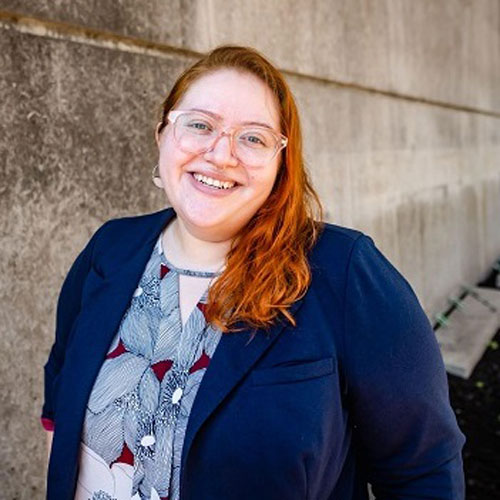September 9, 2020
K-State Libraries hires new digital resources archivist, Irina Rogova

Irina Rogova has joined K-State Libraries as a digital resources archivist. As a part of the Richard L. D. and Marjorie J. Morse Department of Special Collections, Rogova will help digitize collections to make them accessible online to the public. She also will help develop training procedures and workflows for the future Butler Digitization Lab.
The Butler Digitization Lab is thanks to a gift from the Butler Family Community Foundation. The gift will provide Libraries' staff with new, cutting-edge technology to continue preserving historical photos, documents, correspondence and more for future generations.
Rogova said she is excited to work at a learning institution that is closely considering diversity and inclusion initiatives and wants to apply those principles to digital archives.
"In the past, I did a lot of digitization work for a large project and I got interested in the standards and protocols for preserving digital materials and making them accessible to a variety of people on a regular basis," Rogova said. "I want to expand on that idea by focusing on bringing an equitable lens to my work at K-State."
Currently, Rogova is speaking with archivists at universities throughout the nation to learn how other digitization labs operate. Rogova said that this process helps her learn about current best practices and preservation standards in the field. A large part of Rogova's work with the future Butler Digitization Lab will include digitizing analog material from Special Collections to go on an accessible website for people to view materials from anywhere in the world. While some materials, including K-State yearbooks, newspapers and catalogs, are already available online, the digitization program will dig deeper into collections that haven't been fully digitized. Rogova said some of her top goals for the project include establishing a workflow for digitizing materials and ensuring that materials have a long life span and are kept in a secure online location.
Along with digitizing analog materials, Rogova will focus on stewarding born-digital materials to ensure that materials created in the digital realm are also available for researchers. These born-digital materials range from floppy disks and hard drives donated alongside paper collections to websites and social media accounts related to K-State history. While physical archival materials are susceptible to environmental hazards, digital materials come with their own set of threats — from digital degradation to obsolete media types. The Digital Initiatives Unit will be responsible for safeguarding and making accessible both digitized and born-digital materials.
Rogova said she also wants to focus on expanding access to collections that reflect the experiences of everyone at K-State and invite marginalized communities and diverse voices to share more of their stories as well.
"Historically, a lot of stories and archived material comes from people in places of power," Rogova said. "I want to explore options that bring more voices into digital archives and do it in a way that gives them the agency to make sure that what is in the public record reflects their values and beliefs. I think this will help tell a more holistic story of our community's history."
Rogova holds a bachelor's degree in historical studies from Bard College, and a Master of Science in information and library science with an emphasis in archives management from Simmons University.
